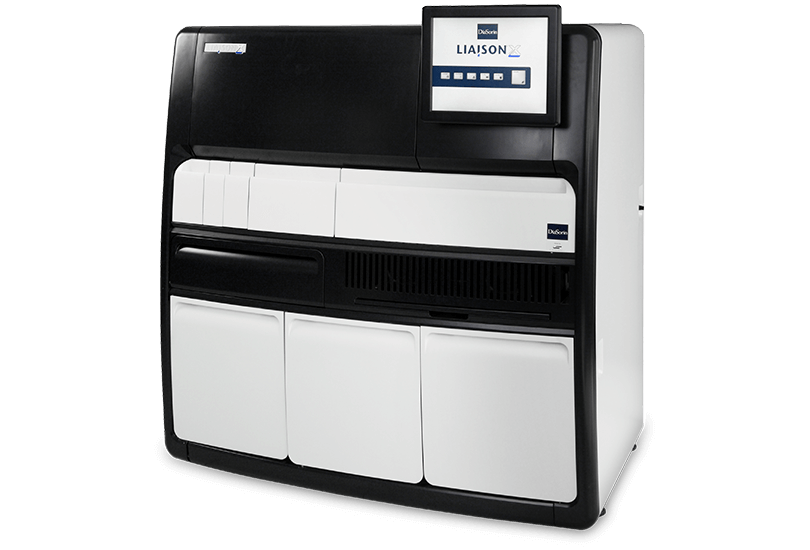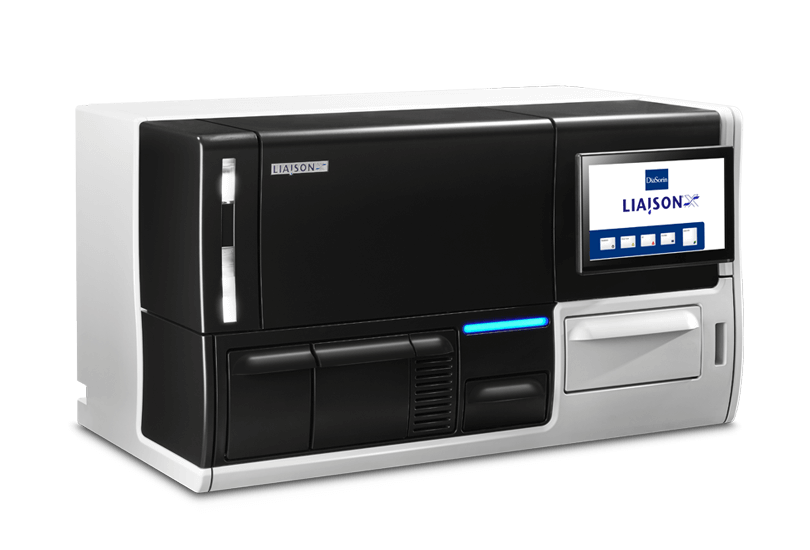LIAISON® PSA II Gen
Automated assay for total PSA in human serum and plasma
The LIAISON® PSA II Gen assay is standardized against the WHO 2nd International Standard for Prostate specific antigen (human) NIBSC code: 17/100, 2019

Background
Essential screening test recommended by EAU guidelines for early detection and management of PCa
Prostate-Specific Antigen (PSA) testing is a crucial tool for early detection of prostate cancer. Recommended by the European Association of Urology (EAU) guidelines, PSA tests measure the level of PSA in the blood, which can be elevated in men with prostate cancer. Early detection through PSA testing can lead to timely and effective treatment, improving patient outcomes and survival rates. Regular screening is advised for men at higher risk, including those with a family history of prostate cancer, African American men, and men over the age of 50. These groups are more likely to develop prostate cancer and benefit significantly from early detection and intervention.
How it works
LIAISON® PSA II Gen is a sandwich chemiluminescence immunoassay. It uses a monoclonal antibody on magnetic particles and an isoluminol-linked antibody. PSA binds to the solid phase, then reacts with the antibody conjugate. After washing, a chemiluminescence reaction measures PSA concentration via relative light units (RLU).
No need for specialized staff
The fully automated LIAISON® PSA II Gen assay runs on the LIAISON® XL and LIAISON® XS chemiluminescence analyzers in any laboratory.
WHO 17/100 standardization
Standardized against the 2nd IS WHO 17/100, LIAISON® PSA II Gen ensures consistent and reliable results. This standardization enhances comparability across labs, improves diagnostic accuracy, and supports better patient management, making it a valuable tool in prostate cancer detection.
High-quality, high efficiency
High performance and outstanding efficiency are ensured by the PSA II Gen on both LIAISON® XL and XS platforms.
Why use LIAISON® PSA II Gen
LIAISON® PSA II Gen provides reliable results, standardized against the WHO 2nd International Standard for PSA. It can be used with both serum and plasma samples, with an improved assay range of 0.03 to 100 ng/ml, aiding in better post-prostatectomy follow-up. Additionally, the kit offers improved on-board stability and 4-week calibration curve stability. Available on the LIAISON® analyzer family.
Efficient automated PSA testing
LIAISON® PSA II Gen and freePSA enable dual testing on the same sample and instrument to enhance diagnostic accuracy and efficiency, providing a comprehensive assessment for better patient outcomes
EAU recomended
LIAISON® PSA II Gen ensures consistent and reliable results in any laboratory, ass recommended by the EAU guidelines for prostate cancer (PCa) detection
Enhanced assay range
LIAISON® PSA II Gen supportis better post-prostatectomy follow-up, increasing survival chances by detecting recurrences early.
Better precision, productivity and workflow
High throughput, improved on-board stability, and a 4-week calibration boost lab productivity, saving costs and enhancing efficiency.
To be used on
Designed for both specialty and routine tests, LIAISON® XL and LIAISON® XS immunoassay analyzers help your laboratory handle multiple patients and tests simultaneously. LIAISON® systems are trustworthy, intuitive and deliver automated continuous operation with minimal user intervention. The result is reduced turnaround time, optimal cost management and unmatched growth potential.

LIAISON® XL
Designed for large laboratories. Fuse the benefits of high throughput and high sensitivity within a powerful and fully automated system that can seamlessly connect to facilitate Total Laboratory Automation.

LIAISON® XS
A fully automated, easy-to-use benchtop analyzer. Maximize productivity with optimal cost management, no daily maintenance, straightforward integration, and the same capabilities as Diasorin’s high-throughput analyzers.
More details about our diagnostic solutions
Login to Dialog for additional resources
Login to our repository for instructions for use and user manuals, assay information, protocols and much more.